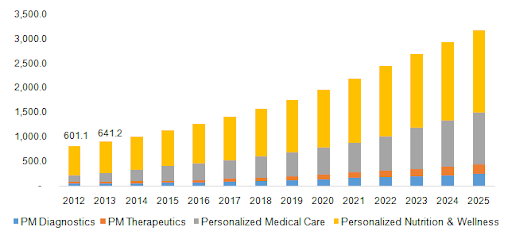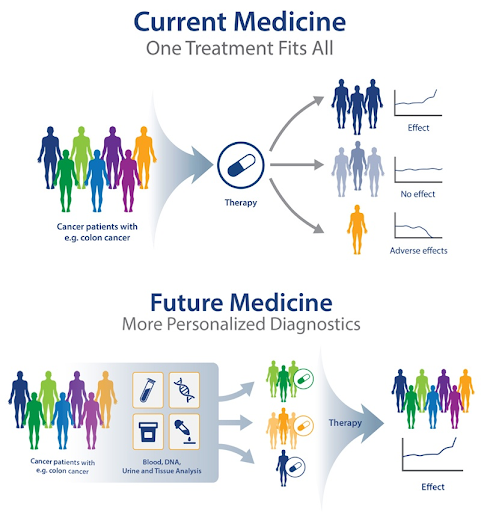As with any new tech that threatens the status quo, there’s a ton of money riding on this young industry crashing and burning.
As a humble member of the working class, I was understandably thrilled to see that the personalized medicine market is planning to do exactly the opposite. Even the most pessimistic forecasts are expecting the market to soar upward of $800 billion by the end of the decade.

Like any American, paying for health care is a significant portion of my own expenses. Any solution to this broken system will hear no complaints from me.
Throwing treatments at the wall to see what sticks has been the standard operating procedure since our great-great-grandparents’ time. Finally, after centuries of wandering around in the dark, doctors have essentially been gifted a road map and a flashlight.
Let me show you exactly where this market is headed…
Health Care Made for You and You Only
In case you haven’t come across it yet, personalized medicine is a rapidly maturing industry that uses DNA analysis to diagnose and treat just about every illness you can imagine.

Similarly, data from telemedicine combines with artificial intelligence (AI) to create a complete snapshot of each patient’s unique healthcare needs, taking all the potentially lethal guesswork out of medical care.
It works at every level: Genetic analysis can help determine what is making you sick, which specific treatment will work best, and how to keep you away from the doctor’s office longer.
Anyone familiar with medical diagnostics knows that’s a breeze compared with the current process. Nowadays, finding out what’s wrong with you can take days of poking and prodding — all of which will send your medical bill through the roof.
Our analysts have traveled the world over, dedicated to finding the best and most profitable investments in the global energy markets. All you have to do to join our Energy and Capital investment community is sign up for the daily newsletter below.
In 2019, genetic medicine injected $265 billion directly into the economy through testing, genome sequencing, and research. Massive companies like Google and IBM are starting to follow the money, each with their own unique spin on genetic analysis.
In a world where unique individuals are bombarded with generic catchall treatments, patients are finally starting to ask the important questions.
For example…
“Why Should I Pay for Someone Else’s Health Care?”
I hear this concern all too frequently when the topic of universal health care makes its rounds on mainstream media. And at the risk of sounding like Ebenezer Scrooge, I’ll wholeheartedly agree it’s a question that needs asking. Why should I have to fork over my own money for a service that doesn’t benefit me personally?
In the case of personalized medicine, the same concept holds true. Why would I pay for treatment that was designed for a totally different person? Or, in many cases, a treatment designed to work with millions of different people?
These are the big questions that are driving the future of medical care. Estimates show that nearly 60% of everyone on Earth will be subjected to a genetic illness at some point in their lives. That means billions of people are just one step away from becoming one of the biggest markets on the planet.

As of 2019, the U.S. spends approximately $11,000 per citizen on health care each year. About 29% of that cost is shouldered by the federal government, aka the taxpayers. The public has been a little spooked by genetic engineering in the past, but new polls show that the tides are quickly turning. One study showed that more than 85% of people were confident in personalized medicine’s ability to improve health care.
Now that public confidence is finally catching up to science, those market predictions could already be obsolete. The biotech industry is churning out new treatments for things like cancer, HIV, and diabetes.
All things considered, I wouldn’t be the least bit surprised to see personalized health care mount a full-scale takeover of the medical industry as early as next year.
We are witnessing the dawn of a totally new era of medical technology. Enjoy your next in-person visit to the doctor — it could very well be one of your last!
To your wealth, Luke Sweeney Luke’s technical know-how combined with an insatiable scientific curiosity has helped uncover some of our most promising leads in the tech sector. He has a knack for breaking down complicated scientific concepts into an easy-to-digest format, while still keeping a sharp focus on the core information. His role at Angel is simple: transform piles of obscure data into profitable investment leads. When following our recommendations, rest assured that a truly exhaustive amount of research goes on behind the scenes..
Contributor, Energy and Capital

